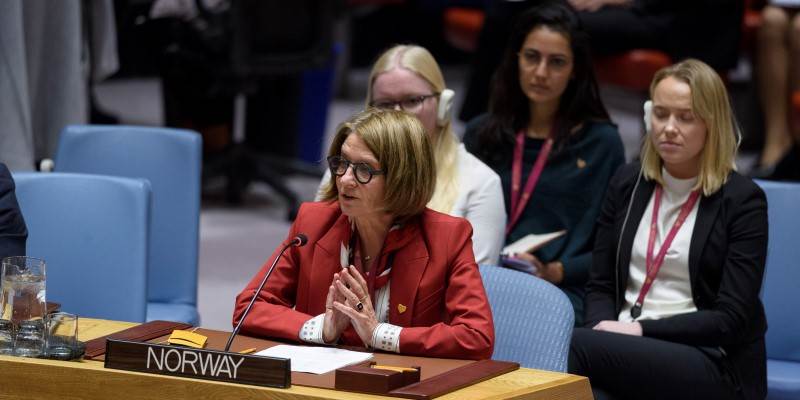I have the honour to speak on behalf of the Nordic countries, Denmark, Finland, Iceland, Sweden and my own country, Norway. We wish to thank the United Kingdom for calling this important open debate.
President,
In the transition to lasting peace, relationships must be rebuilt. And victims’ rights must be at the centre of any peace process.
The peace agreement in Colombia has established a new standard for dealing with victims’ rights, transitional justice, and truth. The broad participation at the negotiation table, inclusive of victims and women, was essential. This led to the establishment of the Truth Commission, the Special Jurisdiction for Peace and the Commission of Missing Persons, which are now fully operational.
Especially in war-torn and polarized societies, the voices and leadership of civic, social and religious leaders are critical to ensuring that a dynamic of reconciliation and dialogue is created.
A clear example of this was in South Africa, whose reconciliation process has served as an inspiration in many peacebuilding efforts since.
Inter-religious or intra-religious dialogues may prove indispensable and useful policy tools that help to foster social cohesion and sustainable peace. Religious actors can provide a gateway to understanding and working with different local communities.
President,
In any conflict, reconciliation efforts must include, and be owned by, the affected communities and their people. But the United Nations has powerful tools at its disposal to assist parties to bring about reconciliation. I would like to highlight five ways we can maximise this role:
First, the UN Security Council must stay engaged long enough, not only to foster, but also to sustain peace. It must make full use of the tools at its disposal to promote reconciliation, including in a phase where the outbreak of hostilities may be imminent.
Second, this Council must continue to develop its partnerships with regional organizations, including the African Union. Regional actors are often the best placed to support lasting reconciliation.
Third, the Peacebuilding Commission has an important role to play in sustaining peace, and its role and resources should be better utilised.
Fourth, The UN must assist in addressing the root causes of conflict. The promotion of economic and social development should, where possible, be connected to efforts to sustain peace.
Fifth, we support the Secretary-General’s call for a surge in peace diplomacy. And we welcome the recently enacted UN reforms to this end. We must draw on the strengths of: UN country teams, the Mediation Support Unit, UN Peacekeeping Operations and Special Political Missions. The UN system should now be better positioned to take a holistic approach. Linking the promotion of: security, development and human rights.
In all these efforts, empowerment of women is key. Excluding half the population from peacemaking simply does not work. Engaging with young people is also crucial if we are to build strong and resilient societies.
Finally, the Nordic countries would like to stress that all of this is only possible if UN Member States ensure that the UN is given the adequate resources, and the support it needs to play an effective role in peace efforts.
Thank you.
